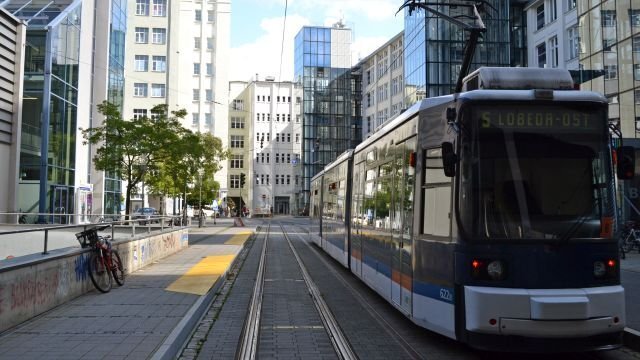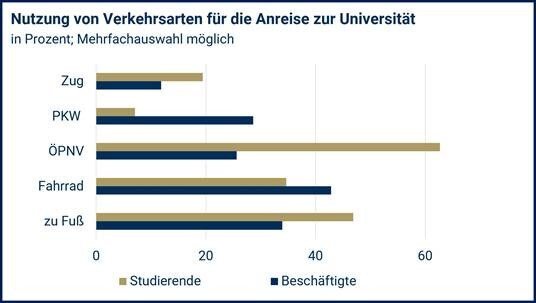
Published: | By: Ute Schönfelder
Source article
How can CO2 emissions be reduced, needs-based offers for climate-friendly mobility and more environmentally friendly working conditions be created at the University of Jena? To find answers to these questions, the Green Office of Friedrich Schiller University conducted a survey among employees and students in 2022. Around 4,200 members of the university took part. The results are now available and have been published in the "Mobility Report 2022".
"A large proportion of the participating university members are already travelling to the university in an environmentally friendly way," says Green Office Manager Robin Muggenthaler, citing a key result of the survey (see illustration). "However, many are still dependent on the car or prefer it due to unattractive alternatives."
At 63 per cent, local public transport is the most popular means of transport used by students to get to university. Many students also walk or cycle. Among employees, the bicycle is the most popular mode of transport at 43 per cent, followed by walking and the car
Picture: Green Office/Universität JenaAccording to Muggenthaler, the long-term goal is therefore to further improve the mobility of university members and staff and to make it more convenient for them to use public transport and bicycles. "This includes, for example, covered and theft-proof bicycle parking spaces and better public transport connections."
Better connections and timetables would make it easier to switch to public transport
The survey showed that a large number of employees and students would be prepared to switch to local public transport if the connections and timetables were better: 50 per cent of the students surveyed and over 40 per cent of employees said that more frequent public transport would be an incentive to use it more than private motorised means of transport. Many respondents criticised the inadequate or lack of connections in rural areas.
Everyone could benefit from such improvements, says Robin Muggenthaler, including those who already travel by bus, train or bicycle: "Not just in environmental terms, social and health aspects of mobility also play a role." Less long and cumbersome journeys to work mean more free time and make travelling to work and study safer and less stressful.
The group of university employees was also asked about their experiences of mobile working during the coronavirus pandemic. The employees were also asked whether they would be willing to regularly share their workplace with colleagues. Most respondents were overwhelmingly positive about the possibility of mobile working and were in favour of continuing it after the pandemic. The university is already fulfilling this wish with the service agreement on mobile working from 2022. However, opinions differ with regard to job sharing: the longer the respondents' contractually agreed working hours, the less willing they are to share their own workplace with colleagues. "In many areas, there is still a lack of suitable office space for this type of working model, but employees will need to be more flexible in the future," summarises Robin Muggenthaler.
